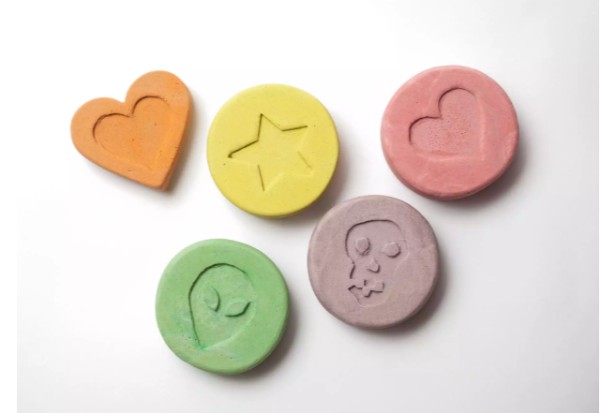
How Long Does Ecstasy (MDMA) Stay in Your System Or Blood?
Ecstasy became popular as a club drug in the 1980s but is now used in a wide range of settings, but it can cause several harmful effects that can be fatal in some cases, and the length of time it remains in the body depends on a number of factors. Ecstasy is typically still detectable for up to 3 days in blood and saliva tests, 5 days in urine tests, and months after last use in hair strand testing.
What Is Ecstasy?
MDMA or Ecstasy is an illegal synthetic drug that people use to experience feelings of well-being, euphoria, and altered perception. The National Survey on Drug Use and Health reports that around 18 million Americans say they have used ecstasy at least once during their lives.
Ecstasy has hallucinogenic and stimulant properties. Street names for the substance include Molly, Adam, beans, clarity, disco biscuit, E, eve, go, hug drug, lover’s speed, peace, STP, X, and XTC, but the chemical name is methylenedioxymethamphetamine (MDMA).
Though pure ecstasy can be dangerous to use, analyses of street ecstasy have found the presence of contaminants such as methamphetamine, ketamine (an anesthetic), caffeine, ephedrine (a diet drug), heroin, phencyclidine (PCP), and cocaine, according to the National Institute on Drug Abuse.1 People sometimes think that Molly, the powdered crystalline form of ecstasy, is safer to use because they mistakenly believe it doesn’t contain the contaminants that ecstasy does, but Drug Enforcement Administration (DEA) analyses found that Molly often contains other drugs and may not have any MDMA in it at all.
Ecstasy is classified as a Schedule I substance under the Controlled Substances Act, meaning there is a high potential for abuse and no accepted medical use in the United States.
Read More: How Long Does Ketamine Last in Your System
How Long Does MDMA Last?
People usually experience ecstasy’s effects 30 to 45 minutes after taking the drug. Effects and their duration vary by dosage, but generally peak in intensity around 15 to 30 minutes after onset. These effects can last 4 to 6 hours but may last for days or even weeks. People who take ecstasy often take 1 or 2 tablets (each tablet typically contains between 50 and 150 milligrams of MDMA) at a time. They may take an additional tablet when the effects of the first dose start to taper, affecting the length of time that ecstasy stays in the system and increasing the potential risks of adverse side effects, too.
The majority of people who use ecstasy take it orally where it is absorbed in the gastrointestinal system. The effects should set in within about 30 minutes after a person takes it and levels of MDMA peak in the system between 1-3 hours after ingestion. When someone takes MDMA, the chemical directly affects the production and reuptake of dopamine, serotonin, and norepinephrine – three neurotransmitters responsible for mood, emotions, decision-making, and thought processes.
Read More: How Long Does Lisinopril Stay in Your System

Factors That Influence How Long Ecstasy Stays In Your System
There are several different factors that dictate how long ecstasy stays in a person’s system and how long different types of drug tests can detect MDMA. These include:
- The frequency at which a person uses the drug and how long they have been using it on a regular basis can affect how long it stays in the system. Someone who took ecstasy some time will be able to pass a drug test sooner than someone who takes ecstasy every day.
- How much of the drug was taken at a time can determine how long it stays in your system. Someone who takes a higher dose will need more time to metabolize and process the substance than someone who takes a small dose.
- A person’s age, weight, and gender all affect the rate at which MDMA is metabolized. Individuals with higher body weight and those of older age will take longer to process MDMA than young and healthy individuals. At the same time, men tend to metabolize substances faster than women.
- Using Ecstasy with other substances such as alcohol can slow down the processing of MDMA in the body, increasing the length of time it takes to eliminate ecstasy from the system. (Read More: How Long Does Alcohol Stay in Your System)
- The method of administration used can also affect how long ecstasy stays in your system. For example, someone who injects or snorts MDMA allows the drug to enter the bloodstream faster than someone who swallows it, so it will be eliminated from their system faster, as well.
How Long Ecstasy Stays In Your Urine, Blood, Saliva, And Hair Follicle
Drug tests are used to screen for metabolites in a person’s system to determine whether or not they have recently used a drug. Different types of drug tests have different detection windows, so the detection time for each drug test varies.
MDMA is not one of the five drugs that are usually screened for on most standard five-panel drug tests, however, it will test positive for amphetamine. If a person fails a drug test for amphetamine, a confirmation test can be run to test specifically for MDMA.
Depending on the type of drug test used, ecstasy is detected in your system for various lengths of time.
Urine Tests
Urine tests are perhaps the most common type of drug test. When doing a urinalysis, you will be asked to pee in a cup and a dipstick will be used to detect drug metabolites. Ecstasy can be detected in your urine for 2-4 days after your last dose.
Saliva Tests
Saliva tests are also rarely used because they can only detect substances for short periods of time after a person uses a drug. Ecstasy can be detected in saliva anywhere between 2 hours and 10 hours after your last dose.
Blood Tests
Blood tests are rarely used because they are invasive compared to other types of drug tests and can only detect drugs for short periods of time. As such, ecstasy can be detected in your blood for 1-2 days after it is taken.
Other Factors That Affect How Long Mdma Stays In Your System
There are several factors that can contribute to how long MDMA will stay in your system, including your overall physical health. Individuals who are in better health, who are active, and more physically fit tend to be able to metabolize ecstasy more efficiently. Additionally, behaviors during use, such as staying well hydrated, can help individuals metabolize MDMA faster.
How To Treat Ecstasy/MDMA Addiction
Individuals who use ecstasy often may also misuse other substances, such as alcohol, cocaine, or other drugs. If you are concerned about your ecstasy use, or a loved one’s use of MDMA, reaching out for professional addiction treatment can help. At our drug rehab in Lafayette, NJ, the addiction treatment specialists at Sunrise House can help address polydrug use and get you on the road to recovery.





Average Rating